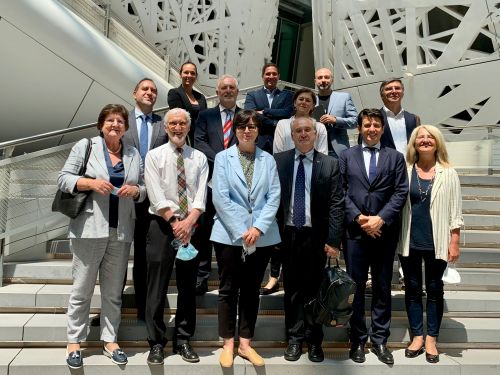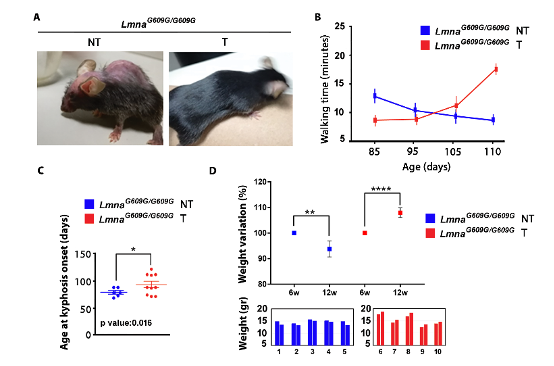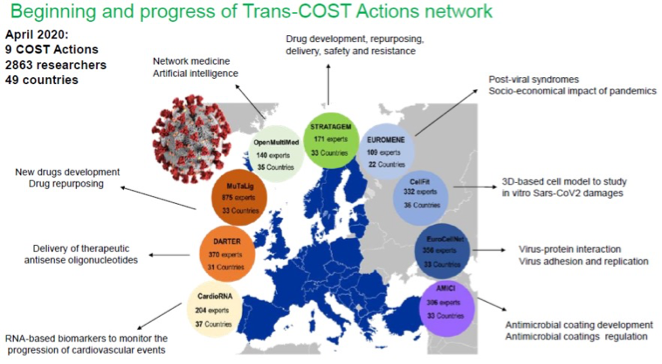IGM-IFOM Joint Seminars – Ylli Doksani
July 1st 2021 – time: 14:30
Ylli Doksani – Scientist at IFOM
“The unexpected consequences of telomere damage”
July 1st 2021 – time: 14:30
Ylli Doksani – Scientist at IFOM
“The unexpected consequences of telomere damage”
June 17th at 14:30
William Blalock – Researcher at the IGM-Bologna
“Innate immune signaling: a link between disease, adaption and evolution”
During her visit to Milan 4, the President was accompanied by Daniela Corda and Sabato D’Auria, respectively directors of the Departments of Biomedical Sciences and Bioagri-food, and she had the opportunity to know the Institute of Biomedical Technologies directed by Gianluca De Bellis (Itb) , which hosts important infrastructures of genomics, proteomics and bioinformatics, and the Institute of Bioimaging and Molecular Physiology (Ibfm) directed by Danilo Porro, where, among others, the physiological and pathogenetic mechanisms related to aging are investigated. The other heads of the Lombard biomedical area also presented their scientific activities: Michela Matteoli, director of the Institute of neuroscience, where important research is carried out to understand the organization and functioning of the nervous system, and Giovanni Maga, director of the Institute of Molecular Genetics, where both healthy and pathological cells are studied through a coordinated strategy and a systemic approach.
At the Human Technopole headquarters, a meeting was held with the director Iain Mattaj, the president Marco Simoni and some representatives of the research areas of the Institute for Life Sciences, who showed the President Carrozza the first laboratory spaces of HT. At this meeting the department and institute directors of the CNR were also present.
“I am happy to have met the colleagues of the CNR Polo in Segrate and to have seen the Human Technopole summit at their headquarters in the morning,” said the President. “These were informal, simple and friendly visits, in the spirit of a meeting between researchers and researchers, but important to prepare for the challenges that the post-pandemic presents us, starting with the ecological transition, digital transformation and health . Challenges in which the contribution of research is fundamental, and particularly of that in the biomedical field, in which I intend to strongly strengthen the role of the CNR”.
“It is a great pleasure to welcome the new Cnr President Maria Chiara Carrozza to Palazzo Italia,” said the director of Human Technopole, Iain Mattaj. «From the very first months of activity, Human Technopole started a dialogue with the representatives of the national research community to build a network of collaboration with the local realities and bring added value to an already very strong ecosystem. We share with the CNR the commitment to enhance scientific excellence, the open and international approach and the goal of training the next generation of researchers “.

June 3rd at 14:30
Pier Giorgio Mastroberardino
“Metabolic rewiring following DNA damage accumulation in neurodegeneration and aging“
May 20th, 2021 at 14:30
Giorgia Zadra, Researcher at the IGM, on:
The Fats and The Furious
Metabolic rewiring fuels aggressive prostate cancer: clinical implications
This work identifies tocilizumab, a neutralizing antibody already exploited in clinical applications, as a valuable therapeutic tool in Hutchinson-Gilford progeria, a disease that causes premature ageing. Data here reported further suggest to explore tocilizumab as a potential treatment for aging-related disorders. The study has been designed and coordinated by CNR IGM Bologna Unit.

Squarzoni S, Schena E, Sabatelli P, Mattioli E, Capanni C, Cenni V, D’Apice MR, Andrenacci D, Sarli G, Pellegrino V, Festa A, Baruffaldi F, Storci G, Bonafe’ M, Barboni C, Sanapo M, Zaghini A, Lattanzi G. (2021) Interleukin-6 neutralization ameliorates symptoms in prematurely aged mice. Aging Cell, 20(1):e13285. doi: 10.1111/acel.13285
Despite the international guidelines on the containment of the COVID-19 pandemic, the European scientific community was not sufficiently prepared to coordinate scientific efforts. To improve preparedness for future pandemics, nine groups of scientists already funded by the European program for Cooperation in Science and Technology (COST), coordinated by Chiara Rignati from Turin University, joined in a network, called Trans-COST Action COVID-19, to facilitate inter-, multi-, and trans-disciplinary communication and collaboration nin order to set-up research strategies and preclinical models for the study of viruses, vaccines and anti-viral drugs.

Giovanna Lattanzi of CNR IGM, is part of the management committee of the EuroCellNet COST Action and, along with the action coordinator Pavel Hozak and colleagues from the other COST actions, contributed to drafting of the proposals.
Vasconcelos MH, Alcaro S, Arechavala-Gomeza V, Baumbach J, Borges F, Brevini TAL, Rivas JL, Devaux Y, Hozak P, Keinanen-Toivola MM, Lattanzi G, Mohr T, Murovska M, Prusty BK, Quinlan RA, Perez-Sala D, Scheibenbogen C, Schmidt HHHW, Silveira I, Tieri P, Tolios A, Riganti C. (2021) Joining European Scientific Forces to Face Pandemics. Trends in microbiology. 29(2):92-97. doi: 10.1016/j.tim.2020.10.008
The next IGM-IFOM seminar will ben on May 6th, at 14:30
The speaker Marco Foiani, Scientific Director of IFOM, entitled:
“Mechanism controlling Genome and Nuclear Integrity”